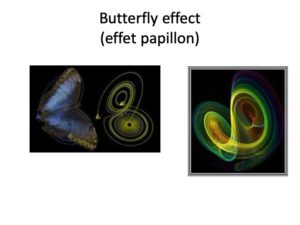by Roy Spencer, October 25, 2019 in GlobalWarming
The UN IPCC scientists who write the reports which guide international energy policy on fossil fuel use operate under the assumption that the climate system has a preferred, natural and constant average state which is only deviated from through the meddling of humans. They construct their climate models so that the models do not produce any warming or cooling unless they are forced to through increasing anthropogenic greenhouse gases, aerosols, or volcanic eruptions.
This imposed behavior of their “control runs” is admittedly necessary because various physical processes in the models are not known well enough from observations and first principles, and so the models must be tinkered with until they produce what might be considered to be the “null hypothesis” behavior, which in their worldview means no long-term warming or cooling.
What I’d like to discuss here is NOT whether there are other ‘external’ forcing agents of climate change, such as the sun. That is a valuable discussion, but not what I’m going to address. I’d like to address the question of whether there really is an average state that the climate system is constantly re-adjusting itself toward, even if it is constantly nudged in different directions by the sun.
…

1575 Winter Landscape with Snowfall near Antwerp by Lucas van Valckenborch.Städel Museum/Wikimedia Commons
…
Prof. Igr. H. Masson, 25 octobre 2019 in ScienceClimatEnergie
1. Un nouveau paradigme : les systèmes chaotiques
« Depuis les premiers balbutiements de la Physique, le désordre apparent qui règne dans l’atmosphère, dans la mer turbulente, dans les fluctuations de populations biologiques, les oscillations du cœur et du cerveau ont été longtemps ignorées ».
« Il a fallu attendre le début des années soixante-dix, pour que quelques scientifiques américains commencent à déchiffrer le désordre, il s’agissait surtout de mathématiciens, médecins, biologistes, physiciens, chimistes cherchant tous des connections entre diverses irrégularités observées. Le syndrome de la mort subite fut expliqué, les proliférations puis disparitions d’insectes furent comprises et modélisées, et de nouvelles méthodes d’analyse de cours boursiers virent le jour, après que les traders aient dû se rendre à l’évidence que les méthodes statistiques conventionnelles n’étaient pas adaptées. Ces découvertes furent ensuite transposées à l’étude du monde naturel : la forme des nuages, les trajectoires de la foudre, la constitution de galaxies. La science du chaos (« dynamical systems » pour les anglo-saxons) était née et allait connaître un développement considérable au fil des années ».
…
…

Figure 4. L’effet papillon : analogie entre les ailes d’un papillon et l’attracteur étrange découvert par E. Lorenz.
…
La géologie, une science plus que passionnante … et diverse


